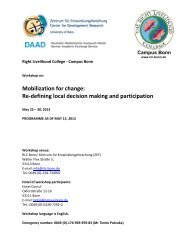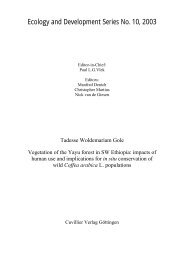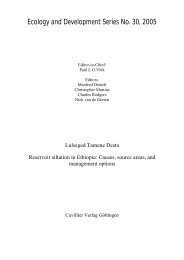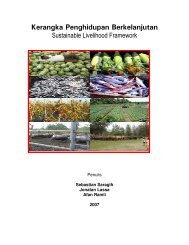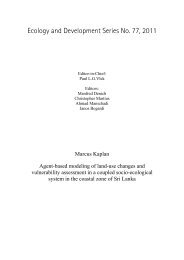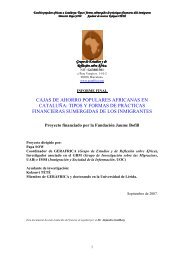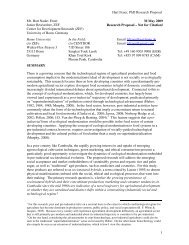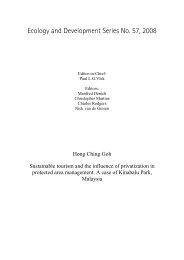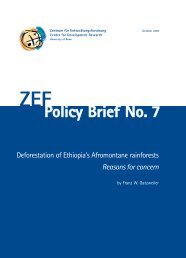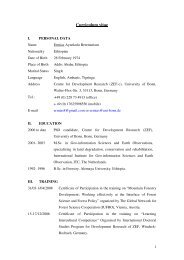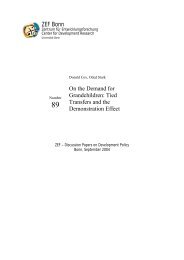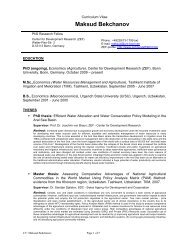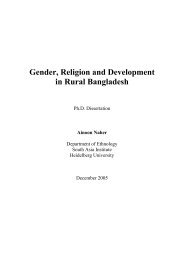ZEF Bonn
ZEF Bonn
ZEF Bonn
Create successful ePaper yourself
Turn your PDF publications into a flip-book with our unique Google optimized e-Paper software.
Rural labour markets are highly distorted, and their efficiency depends on appropriate<br />
natural resource management. As wages from agricultural labour are often the<br />
main source of income in rural areas, it is necessary to determine the existing rigidities<br />
and to fully understand how rural labour markets work in order to assess their<br />
impact on household welfare and poverty. Although they are further advanced,<br />
many Central and Eastern European (CEE) countries seem to show similar patterns<br />
of economic transition to those of developing countries. Can we learn from the<br />
transition experiences of CEE economies and draw lessons for developing countries<br />
and vice versa? This <strong>ZEF</strong> project, which is funded by the Robert Bosch Foundation,<br />
Stuttgart, compares the linkages between rural labour markets, natural resource<br />
management and poverty in Romania with Tanzania. Ultimately, overall economic<br />
growth critically depends on the functioning of (factor) markets and their agents,<br />
which suggests the application of a multi-sector economy-wide modelling framework<br />
that features macro, mezzo, and micro elements and allows the integration of<br />
bio-economic modelling components for our particular purposes. <strong>ZEF</strong> plays a<br />
pioneering role in this field of research.<br />
2.2.3 Environmental, food safety and social standards in the context of WTO<br />
The collapse of trade negotiations in Seattle in December 1999 and the Ministerial<br />
Declaration of Doha have brought the debate on social and environmental standards<br />
as well as food safety issues to the forefront of post-Uruguay Round multilateral<br />
trade talks. There are major frictions of different country groups under the World<br />
Trade Organization (WTO). Research at <strong>ZEF</strong> sheds light on the relevant WTO agreements<br />
dealing with technical as well as sanitary and phytosanitary standards and<br />
potential outcomes of setting standards. A list of alternative policy responses and<br />
strategies to tackle environmental issues in the context of international trade is proposed<br />
that includes eco-labelling and other labelling schemes, reducing subsidies,<br />
multi-lateral environmental agreements, or technical assistance, and mutual recognition<br />
of equivalent standards. In addition, broader issues related to the demand for<br />
including minimum labour standards in the form of a social clause in the WTO have<br />
been reviewed, and the impact of social labelling has been analysed. Furthermore,<br />
<strong>ZEF</strong> research has looked at the issue of how to integrate the interests of developing<br />
countries more effectively into the new development round.<br />
2.3 Efficiency in Resource Utilisation and Technologies<br />
for Development<br />
At <strong>ZEF</strong>, special attention is paid to the four natural resources forests, water, land<br />
and biodiversity as well as the institutional perspective of natural resource management<br />
(NRM). The efficiency of NRM in turn also depends on new technologies like<br />
information and communication technology (ICT) and biotechnology, which are<br />
included in <strong>ZEF</strong>'s research agenda too.<br />
2.3.1 Management of tropical forests<br />
Stabilisation of forest margin areas through poverty alleviation can contribute to<br />
lowering the pressure on forest areas. Technical and institutional progress and new<br />
policies offer means to increase productivity and to improve smallholder livelihoods.<br />
<strong>ZEF</strong>'s research project on “Smallholders in the Eastern Amazon: Interactions between<br />
eco-system and social system in the management of tropical forests" is cofunded<br />
by the German Federal Ministry of Education and Research (BMBF) as part<br />
of the bilateral SHIFT (Studies on Human Impact on Forests and Floodplains in the<br />
Tropics) project. It evaluates agricultural innovations for smallholders operating in<br />
Research<br />
<strong>ZEF</strong>'s research on smallholders<br />
in the Eastern Amazon evaluates<br />
agricultural innovations for<br />
smallholders operating in fallow<br />
systems in the region. The<br />
evaluation includes a bio-economic<br />
modelling approach to<br />
quantify land use decisions<br />
under different policy scenarios<br />
and a comparative analysis<br />
to assess the significance of<br />
the results for other areas in<br />
the Amazon.<br />
51



